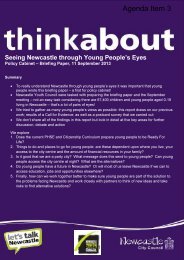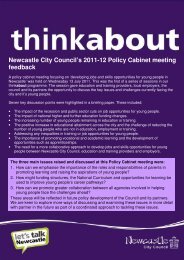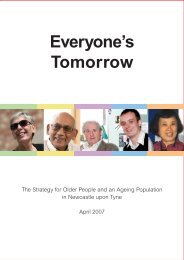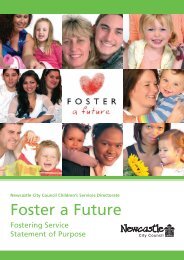NEWCASTLE'S MUSICAL HERITAGE AN INTRODUCTION By ...
NEWCASTLE'S MUSICAL HERITAGE AN INTRODUCTION By ...
NEWCASTLE'S MUSICAL HERITAGE AN INTRODUCTION By ...
You also want an ePaper? Increase the reach of your titles
YUMPU automatically turns print PDFs into web optimized ePapers that Google loves.
then even in the villages for musicians to wait on others for a small fee and an<br />
important branch of musical activity for some centuries was that of Waits. These<br />
were known as the Town’s Waits and in Newcastle were dressed in three-cocked<br />
hats and blue cloaks. These municipal musicians strolled the streets at night<br />
playing on some instrument to mark the hours and wakening the chief citizens in<br />
the morning by music before their windows. They also provided music on civic<br />
occasions as they may well have done in Newcastle in 1633 when King Charles<br />
paid a visit to the city on his way to Edinburgh to be crowned King of Scotland<br />
and later, when they most certainly did for Oliver Cromwell. He was wined and<br />
dined as a guest of the city. ‘The people received him with very great<br />
acknowledgements of love and he and his officers were sumptuously entertained<br />
by the mayor. While at dinner in the mayor’s house the town’s waits played<br />
outside on a little bridge over the Lort Burn near Sandhill.‘ The Waits were an<br />
important branch of musical activity in England generally and continued in<br />
Newcastle until in the 1790s when ‘amidst some modern, narrow, and gloomy<br />
schemes of economy, the company was discharged’.<br />
What effect the Reformation had on music in 17 th century Newcastle is difficult<br />
to say but generally it is thought that by the time Charles II returned to the throne<br />
in 1660 musical England was in a morose state. On the other hand one can<br />
imagine that Cromwell was much less concerned about what was going on in the<br />
North East and we had after all entertained him well! Cromwell, himself, was very<br />
musical; he sang psalms after dinner, held musical gatherings, employed a<br />
keyboard tutor for his daughter, and a personal organist. Perhaps the most<br />
revealing aspect of Cromwell’s musical side is to find that at the wedding of his<br />
daughter ‘They had forty eight violins, and much mirth and frolics, besides mixt<br />
dancing’. Musical expression was as much a part of life in Newcastle then as<br />
now, in the church, in the small select musical gatherings of the gentry and in the<br />
boisterous, bawdy music making of the illiterate masses. And behind the<br />
personality of each of these strands lay the common property of all. Since the<br />
Middle Ages music had sought to free itself from the restrictions of the church<br />
and there had emerged around the mid 16 th century a new art form known as<br />
secular music. The term is not really very helpful for the purposes of definition<br />
because with vocal music much of it was written for domestic use and was<br />
unambiguously sacred. But then there was the question of social functions and<br />
circumstances of performance to consider as well as publication. Secular<br />
instrumental music had established itself somewhat earlier than vocal, around<br />
1540, as a fully independent repertory and a self-sufficient art form weaned from<br />
its liturgical dependence.<br />
Travelling musicians were largely responsible for bringing this music to the<br />
attention of the people, and by the seventeenth century the skill and virtuosity of<br />
these minstrels had reached a high standard. Although these purveyors of song<br />
and melody had not always been welcomed by everyone and the Church had<br />
tended towards the view that minstrels were purveyors of filth and sin and who<br />
speaks filth is the servant of Lucifer. The power of music as an incitement to lust<br />
7

















